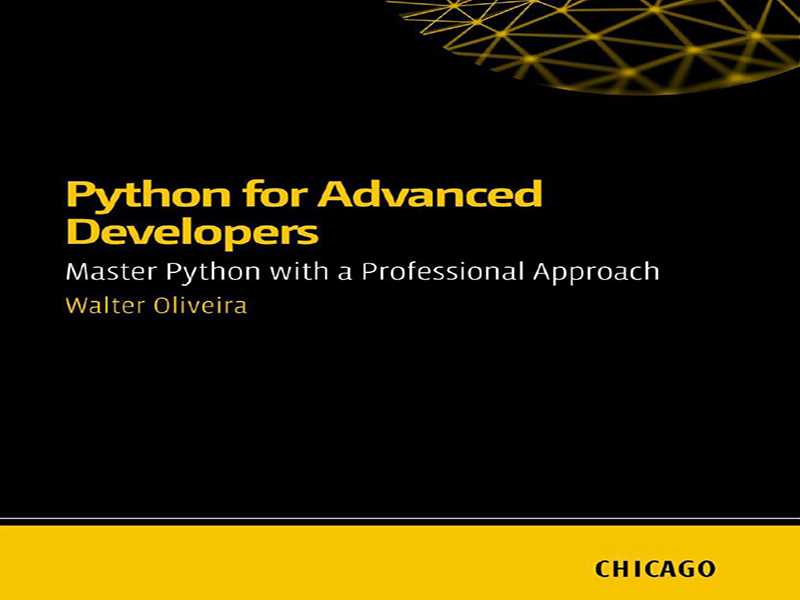- عنوان کتاب: Python for Advanced Developers
- نویسنده: Walter Oliveira
- حوزه: برنامهنویسی پایتون
- سال انتشار: 2025
- تعداد صفحه: 653
- زبان اصلی: انگلیسی
- نوع فایل: pdf
- حجم فایل: 27.1 مگابایت
در حوزه برنامهنویسی پیشرفته پایتون، این زبان طیف وسیعی از ویژگیها و قابلیتهای باورنکردنی را ارائه میدهد که فراتر از اصول اولیه هستند. این فصل به جنبههای اصلی پایتون میپردازد که هر توسعهدهنده متخصصی باید برای نوشتن کدهای کارآمدتر، قابل نگهداریتر و مقیاسپذیرتر بر آنها تسلط داشته باشد. با افزایش محبوبیت پایتون در حوزههای مختلف – توسعه وب، علوم داده، اتوماسیون، یادگیری ماشین و موارد دیگر – درک پیچیدگیهای عمیقتر نحو، معناشناسی و بهترین شیوههای آن ضروری میشود. این بخش برای توسعهدهندگانی طراحی شده است که از قبل با پایتون آشنا هستند و به دنبال آزاد کردن پتانسیل کامل این زبان با بررسی مفاهیم پیشرفتهای هستند که میتوانند تخصص برنامهنویسی آنها را به طور قابل توجهی بهبود بخشند. پایتون در هسته خود، نحو ساده و زیبایی را ارائه میدهد، اما هرچه عمیقتر به ویژگیهای پیچیدهتر آن بپردازید، ابزارهای قدرتمندی را کشف خواهید کرد که به شما امکان میدهند کدهای بسیار بهینه و انعطافپذیری بنویسید. این ابزارها فراتر از ساختارهای اساسی مانند حلقهها و شرطها هستند و به مفاهیمی مانند برنامهنویسی متا، مدیریت حافظه پیشرفته و الگوهای برنامهنویسی تابعی میپردازند. تسلط بر این تکنیکهای پیشرفته میتواند عملکرد برنامههای شما را به طرز چشمگیری بهبود بخشد و شما را قادر سازد تا مسائل پیچیدهتر را با کد کمتر حل کنید. یکی از حوزههای کلیدی که برنامهنویسی پیشرفته پایتون را تعریف میکند، توانایی کار با ماهیت پویای این زبان است. پایتون به توسعهدهندگان اجازه میدهد تا رفتار کد خود را در زمان اجرا تغییر دهند و اجزای بسیار انعطافپذیر و قابل استفاده مجدد ایجاد کنند. مفاهیمی مانند دکوراتورها، ژنراتورها و تکرارکنندهها روشی کارآمد برای مدیریت وظایف تکراری، مدیریت منابع و کنترل جریان اجرا بدون شلوغ کردن پایگاه کد ارائه میدهند. درک عمیق از این مکانیسمها میتواند درهایی را برای نوشتن کد تمیزتر و ماژولارتر که نگهداری و گسترش آن آسانتر است، باز کند. یکی دیگر از جنبههای حیاتی برنامهنویسی پیشرفته پایتون، نحوه مدیریت حافظه و عملکرد توسط زبان است. برای برنامههای بزرگتر، استفاده کارآمد از حافظه و زمان اجرای بهینه بسیار مهم میشود. سیستم جمعآوری زباله پایتون پیچیده است، اما دانستن نحوه تنظیم دقیق آن و کار با مدیریت حافظه سطح پایین میتواند به شما در جلوگیری از تنگناهای عملکرد کمک کند. ابزارهای پروفایلینگ و تکنیکهای بنچمارک به توسعهدهندگان اجازه میدهد تا عملکرد کد را در سناریوهای دنیای واقعی تجزیه و تحلیل کنند و مناطقی را که نیاز به بهینهسازی دارند شناسایی کنند. مدیریت خطای پیشرفته و مدیریت استثنا نیز برای ساخت برنامههای قوی بسیار مهم هستند. سیستم استثنا پایتون هم قدرتمند و هم انعطافپذیر است و به توسعهدهندگان اجازه میدهد تا موقعیتهای غیرمنتظره را به طرز ماهرانهای مدیریت کنند. با درک پیچیدگیهای زنجیرهسازی استثنا، کلاسهای استثنای سفارشی و ثبت پیشرفته خطا، توسعهدهندگان میتوانند قابلیت اطمینان و پایداری برنامههای خود را در محیطهای تولید بهبود بخشند. این فصل همچنین بررسی میکند که چگونه اصول برنامهنویسی شیگرا (OOP) پایتون را میتوان به سطح بعدی رساند. با بهرهگیری از تکنیکهای پیشرفته OOP، توسعهدهندگان میتوانند کدی با قابلیت استفاده مجدد، توسعهپذیر و قابل نگهداری ایجاد کنند که با افزایش اندازه و پیچیدگی پروژهها، به خوبی مقیاسپذیر باشد. رویکرد پایتون به OOP هم شهودی و هم انعطافپذیر است و مکانیسمهای قدرتمندی برای وراثت، چندریختی و کپسولهسازی ارائه میدهد. با تکامل پایتون، این زبان بسیاری از الگوهای برنامهنویسی مدرن، مانند برنامهنویسی تابعی را در خود جای داده است. با گنجاندن مفاهیم برنامهنویسی تابعی، توسعهدهندگان میتوانند کد تمیزتر و اعلانیتری بنویسند که از عوارض جانبی جلوگیری میکند و وضوح منطق را بهبود میبخشد. در این فصل، هدف ما ارائه یک راهنمای جامع برای تسلط بر این تکنیکهای پیشرفته است که به شما کمک میکند تا از قدرت واقعی پایتون برای ساخت برنامههای پیچیده و با عملکرد بالا استفاده کنید.
In the realm of advanced Python programming, the language offers an incredible range of features and capabilities that go far beyond the basics. This chapter delves into the core aspects of Python that every expert developer should master to write more efficient, maintainable, and scalable code. As Python continues to grow in popularity across different domains— web development, data science, automation, machine learning, and more— it becomes essential to understand the deeper intricacies of its syntax, semantics, and best practices. This section is designed for developers who are already familiar with Python and are looking to unlock the full potential of the language by exploring advanced concepts that can significantly improve their programming expertise. At its core, Python provides a simple and elegant syntax, but as you dive deeper into its more complex features, you will discover powerful tools that allow you to write highly optimized and flexible code. These tools extend beyond basic constructs like loops and conditionals, touching on concepts such as metaprogramming, advanced memory management, and functional programming paradigms. Mastering these advanced techniques can drastically improve the performance of your applications and enable you to solve more complex problems with less code. One key area that defines advanced Python programming is the ability to work with the language’s dynamic nature. Python allows developers to modify the behavior of their code at runtime, creating highly flexible and reusable components. Concepts like decorators, generators, and iterators offer an efficient way to handle repetitive tasks, manage resources, and control the flow of execution without cluttering the codebase. A deep understanding of these mechanisms can open doors to writing cleaner, more modular code that is easier to maintain and extend. Another vital aspect of advanced Python programming is how the language manages memory and performance. For larger applications, efficient memory usage and optimized execution times become crucial. Python’s garbage collection system is sophisticated, but knowing how to fine-tune it and work with low-level memory management can help you avoid performance bottlenecks. Profiling tools and benchmarking techniques allow developers to analyze code performance in real-world scenarios and identify areas where optimization is needed. Advanced error handling and exception management are also critical to building robust applications. Python’s exception system is both powerful and flexible, allowing developers to handle unexpected situations gracefully. By understanding the intricacies of exception chaining, custom exception classes, and advanced error logging, developers can improve the reliability and stability of their applications in production environments. This chapter will also explore how Python’s object-oriented programming (OOP) principles can be taken to the next level. By leveraging advanced OOP techniques, developers can create highly reusable, extendable, and maintainable code that scales well as projects grow in size and complexity. Python’s approach to OOP is both intuitive and flexible, offering powerful mechanisms for inheritance, polymorphism, and encapsulation. As Python continues to evolve, the language has incorporated many modern programming paradigms, such as functional programming. By incorporating functional programming concepts, developers can write cleaner, more declarative code that avoids side effects and improves the clarity of logic. With this chapter, we aim to provide a comprehensive guide to mastering these advanced techniques, helping you harness the true power of Python for building sophisticated and high-performing applications.
این کتاب را میتوانید از لینک زیر بصورت رایگان دانلود کنید:
Download: Python for Advanced Developers



































نظرات کاربران